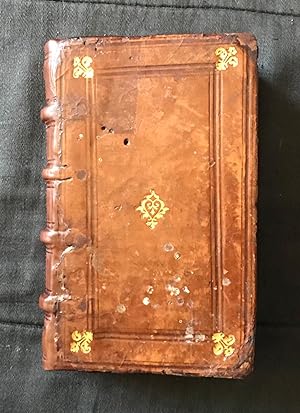Riguardo questo articolo
FICINO, Marsilio. De Vita Libri tres, quorum Primus, de studiosorum Sanitate tuenda. Secundus, de Vita producenda. Tertius, de Vita coelitus comparanda. Lyon, Apud Gulielmum Rouillium, sub scuto Veneto, 1560. £2000 16mo, pp. 461 (iii), a-z A-F8. One work in three volumes bound together. Roman letter, some Italic. Title page with woodcut vignette of an eagle standing on a globe placed on a plinth and sided by two snakes; motto: in virtute, / et fortuna. Floriated initials, meanders, head- and tailpieces. Early ms. autograph in capital letters on front cover, twice, and in cursive on t-p: Laurens Viguier , probably the same person who left ink underlining and marginalia throughout the book. Stamp of the library of Saint Peter ad Vicula (Rome) on t-p and library shelf mark label on front pastedown. Some rare marginal spotting and light age browning to page edges. In a fine contemporary blind-ruled calf binding with gilt-tooled fleurons at centre of covers and towards corners; skilfully rebacked. A lovely copy. The De vita libri tres (Three Books on Life) was written in the years 1480 89 by the Italian Platonist Marsilio Ficino. It was first circulated in manuscript form and then published on December 3, 1489. It was constantly in print throughout the middle of the seventeenth century. The present copy is an excellent pocket edition. The first book is about physical health, the second is about prolonging life, and the third (De vita coelitùs comparanda) is about astral influences. The work focuses not only on the soul and the body, but also, and especially, on the notion of spiritus . The work focuses on the health and wellbeing of the scholar. Scholars are described as being naturally prone to extremes of melancholy and thus the ambivalent influence of Saturn, which can be remediated by the influence of the benign planets (the Sun, Jupiter, Venus and Mercury). Ficino considers three types of things beneficial to the spirit: wines and aromatic substances, odours and clean air, and music. De vita is an amalgam of philosophy, medicine, magic, and astrology. Alongside passages explaining the immortality and divine source and nature of the soul, there are astrological charts and remedies, speeches from various Greek gods arguing with one another, philosophical digressions, medieval prescriptions for various ills, attempts at reconciling the Neoplatonism of Plotinus with Christian Scriptures, and magical remedies and talismans. Ficino was one of the major philosophical voices of the Italian Renaissance, but he was also a physician, and the son of a physician. De vita is an example of the medical thinking of the early Renaissance, steeped in Galen and Hippocrates and the theory of the four humours and their attendant Aristotelian qualities (e.g., hot, cold, moist,dry), but also beginning to align this viewpoint with the awakening sense of the archetypal significance of the pagan gods, derived from the first exposure in the West for many centuries to the dialogues of Plato and to the Corpus hermeticum. Gültlingen X p. 128: 470; FB 70552; USTC 152867. Codice articolo ABE-1522856600117
Contatta il venditore
Segnala questo articolo
![]()




